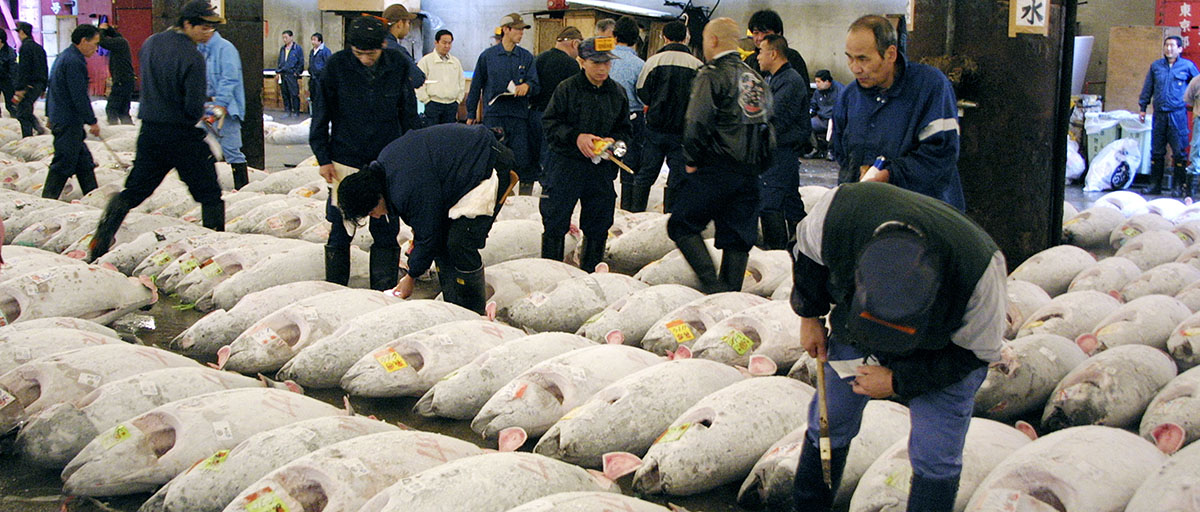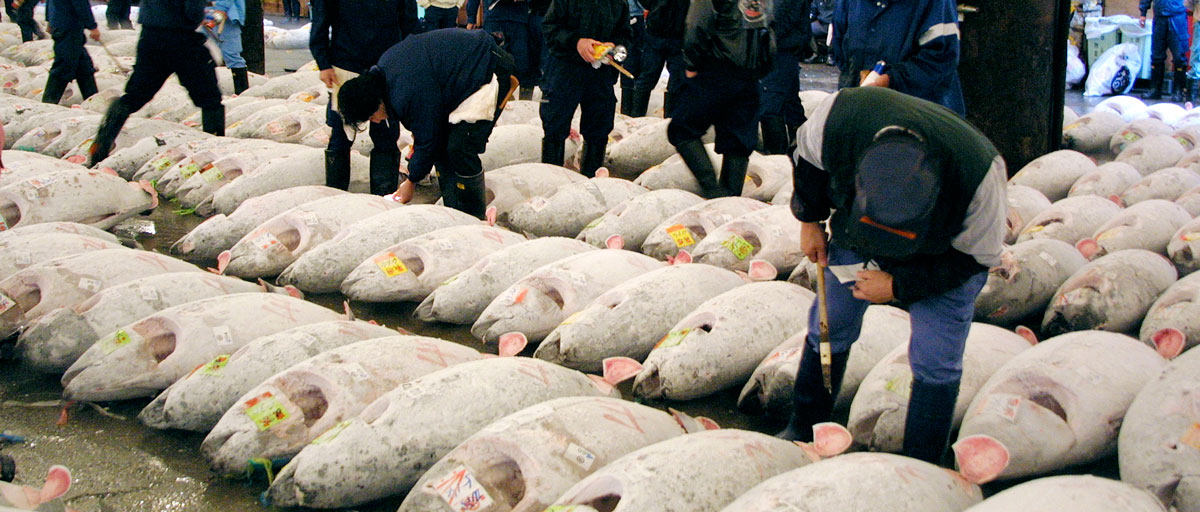
A new study reveals that 13 companies shape very large marine ecosystems around the world and are involved in both wild capture fisheries and aquaculture, including tuna. Despite their influence on marine ecosystems, they have yet assumed this responsibility. Photo: A. Maslennikov/Azote
Global fisheries
Keystone actors shape marine ecosystems
13 corporations control up to 40 per cent of world's most valuable fisheries
- The average annual revenues of the 160 largest companies in 2012 exhibit a
distinct keystone pattern, where the top 10% account for 38 % of total
revenues - Thirteen companies shape very large marine ecosystems around the world
- Such omnipotence represents both a challenge and an opportunity for the governance of global fisheries
Only 13 corporations control 19-40% of the largest and most valuable stocks and 11-16 % of the global marine catch, according to new research published in the journal PLOS ONE.
These "keystone" corporations of the global seafood industry (see complete list below) critically shape the future of marine ecosystems, but have yet to assume this responsibility at the global scale.
The new study makes an analogy between the largest companies in seafood industry and keystone species in ecological communities.
Profound effect
Keystone species in nature have a profound effect on the structure and function of the ecosystem and disproportionately determine the prevalence and activities of other species.
"The phenomenon of keystone actors is an increasingly important feature of our human-dominated world. Active leadership in sustainability initiatives by these corporations could result in a cascade through the entire seafood industry towards improved management of marine living resources and ecosystems," says lead author and centre deputy science Director Henrik Österblom.
"Increasing demand for seafood has contributed to a global fisheries crisis, with consequences for marine ecosystems around the world," Österblom adds.
Existing analyses of global fisheries operations have, however, so far largely focused on the role of countries, rather than industry corporations.
"Several of the fishing companies we investigated are larger than most nations in terms of their share of global catches"
Henrik Österblom, lead author
The group of researchers behind the article also include centre researchers Jean-Baptiste Jouffray, Carl Folke, Beatrice Crona, Max Troell, Andrew Merrie and Johan Rockström.
A handful of dominating corporations
The study found that the average annual revenues of the 160 largest companies in 2012 exhibit a distinct keystone pattern, where the top 10% account for 38 % of total revenues.
Among these, the authors analysed thirteen companies (see box below) more in detail and found that they shape very large marine ecosystems around the world and are involved in both wild capture fisheries and aquaculture, including whitefish, tuna, salmon, shellfish, fishmeal, fish oil, and aqua feeds.
Their combined annual revenues correspond to 18% of the global value of seafood production in 2012 (US$ 252 billion).
This handful of corporations, representing 0.5% of 2250 registered fishing and aquaculture companies worldwide, dominate all parts of seafood production, operate through an extensive global network of subsidiaries and are profoundly involved in fisheries and aquaculture decision-making.
Such omnipotence represents both a challenge and an opportunity for the governance of global fisheries.
"Several of the fishing companies we investigated are larger than most nations in terms of their share of global catches. Our study reframes the responsibility for fishing in terms of transnational corporations, illustrating that they must be included into the equation if we are to solve the global sustainability crisis in marine ecosystems,” says co-author Jean-Baptiste Jouffray.
Novel opportunities
Such keystone actors among corporations, the authors say, can be defined by the following characteristics:
a) they dominate global production revenues and volumes within a particular sector
b) control globally relevant segments of production
c) connect ecosystems globally through subsidiaries
d) influence global governance processes and institutions
"Similar keystone actors also exist in other sectors, like meat and grain production, and they all have high relevance for sustainable management of natural resources and the environment. Our study illustrates a key feature of globalization that opens up for novel opportunities to think about ways to address current challenges," concludes co-author and centre science director Carl Folke.
The 13 investigated companies
Maruha Nichiro (Tokyo, Japan): A globally operating seafood company active in most segments of seafood production
Nippon Suisan Kaisha - Nissui (Tokyo, Japan): A globally operating seafood company active in most segments of seafood production
Thai Union Frozen Products (Samutsakorn, Thailand): The world’s largest canned tuna producer and fifth largest shrimp farmer (2011)
Marine Harvest (Bergen, Norway): The world’s largest salmon producer and the most actively traded stock in the seafood sector
Dongwon Industries (Seoul, South Korea): A national (75% of Korean canned tuna market share) and world leading tuna producer (together with Thai Union)
Skretting (Stavanger, Norway): A leading salmon feeds producer
Pescanova (Pontevedra, Spain): The world’s second largest shrimp producer and the largest fishing company in the European Community
Austevoll Seafood (Storebø, Norway): The world’s largest fishmeal company and second largest salmon producer
Pacific Andes (Hong Kong, China): The world’s second largest fishmeal producer
EWOS (Oslo, Norway): A leading salmon feeds producer
Kyokuyo (Tokyo, Japan) Similar to Maruha Nichiro and Nissui, but with relatively more limited operations
Charoen Pokphand Foods - CP Foods (Bangkok, Thailand): The world’s largest shrimp farmer and the largest shrimp feeds producer
Trident Seafood (Seattle, USA): The largest seafood company in North America
citation
Österblom, H., Jouffray, J-B., Folke, C., Crona, B., Troell, M., Merrie, A., and Rockström, J. 2015. Transnational corporations as ‘keystone actors’ in marine ecosystems. PLOS ONE, http://dx.plos.org/10.1371/journal.pone.0127533
Henrik Österblom is Deputy Science Director at Stockholm Resilience Centre. He holds a position as senior lecturer in environmental sciences with a particular focus on ecosystem-based management of the Baltic Sea. His primary research interests are: social-ecological dynamics of the Baltic Sea, international marine governance and seabirds and ecosystem change.







